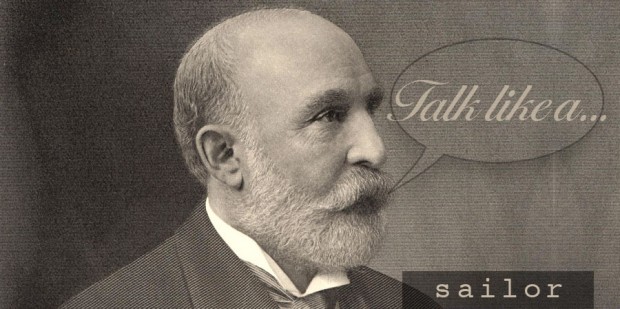Sailor Talk (You kiss your mother with that mouth?)

JAMES FRANK STARR served aboard the USS Bon Homme Richard. That was an aircraft carrier that sailed in the Navy’s Pacific fleet from late World War II through the Vietnam War. My father, along with the plastic replica of his ship that I assembled as a boy, are the closest I ever got to military service, but I knew from his reticence on the matter that he was happy I didn’t follow in his footsteps. My own feelings are mixed.
JFS remains one of my heroes and instilled in me a deep reverence for the power of honesty and integrity. But he did so in very few words. He made every one count.
In general, Dad was the kind of man who used to be called “the strong, silent type,” and so I was spared the sailor talk, except on the occasion of one of his misdirected hammer blows or an encounter with low clearance in the attic. But you can’t grow up around someone from an older generation without inheriting at least an appreciation for by-gone jargon.
Here then is this week’s installment of Talk Like A ____, featuring the colorful language of seafarers, excerpted from The American Thesaurus of Slang.
SLANG REFERRING TO OTHER SEAMEN: Rover boy, sea weed, swabby, swab jockey (a sailor); Mac, Mate, Matey, Joe Gish (nicknames for sailors and Marines); feather merchant (a Naval Reservist, especially an officer who received his commission through influence); bellhop, jarhead (a Marine); amphib (a member of the Amphibious Forces); bungalow sailor, beach pounder, dune leaper, sand pounder (a Coast Guardsman on shore duty); boot (a recruit in the first stage of training, originally in the Marine Corps); bootie (a beginner in the women Marines); keys (a storekeeper); feathers, pens, pencils (a yeoman); asbestos papa (a fire fighter); tube (a torpedo man); sun dodger (a sailmaker); deck ape or monkey (a member of the deck crew); slushy, Whitie (ship’s cook); spud cox’n (a galley helper); vessel man (a pot washer); oil king (the man detailed to check oil aboard ship); cathead kid (one on a mine planter who guards the mine cable over the cathead); Turkshead McGuirk (a man skilled in tying knots); flag waver (landing signal officer on a carrier); captain of the hold (one detailed to the care of the hold); first lieutenant (an unofficial title applied to the head of the construction and repair department); Tincus (Tamper-in-Chief, U.S Navy, from “turf tamping,” impatiently awaiting action); striker (a helper); scuttle bum (the Navy’s left-hand man, who can always be counted on to “foul up the works”); bell tapper (one slow in taking his post); brig rat, brig timer (a prisoner); pal (a prisoner at large); bathtub sailor (one on special duty who has never been to sea); pollywog (one who has not crossed the equator); shellback (one who has crossed the equator); dragon back (one who has crossed the 180th meridian); cub (one who has not crossed the Arctic Circle); Griffin (a Marine with less than a year of Asiatic duty); Asiatic (a Marine who has spent a long time at Asiatic stations, said to be slightly affected by too much foreign duty); Shanghai (one stationed overlong in China); gundecker, smoke stacker (a pretender, one who feigns intoxication, tells far-fetched stories etc.); sea wolf, wolf in ship’s clothing (a sailor ambitiously interested in female conquest); baluke, gulping (a stupid or disliked person). SLANG REFERRING TO OFFICERS: H.P.H. (high paid help), varsity crewmen; Square Knot Admiral (a petty officer ashore); Chief, crow, hack driver (a chief petty officer); gunny, guns (gunner’s mate); boats (bos’n’s mate); wheels, QM. (quartermaster).